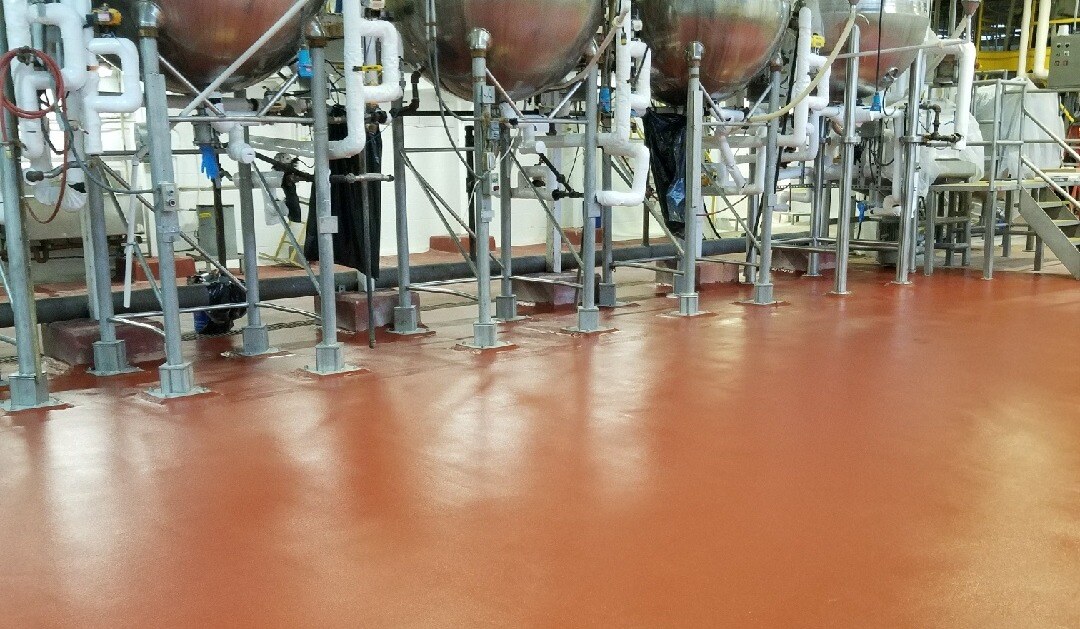
If your facility demands a floor that can withstand intense heat, heavy equipment, moisture, and harsh chemicals, urethane cement might be the flooring solution you’ve been looking for. From commercial kitchens to pharmaceutical plants, this high-performance material offers a blend of strength and resilience that goes far beyond traditional concrete or epoxy.
CustomCrete has installed urethane cement systems across a variety of industrial and commercial environments in the Chicago area. With years of hands-on experience, we’ve seen firsthand how this system performs under pressure—and why so many businesses choose it for long-term flooring durability.
In this guide, we’ll explain what urethane cement is, how it works, and whether it’s the right choice for your space.

What is Urethane Cement?
Urethane cement, also known as urethane mortar or polyurethane concrete, is a hybrid flooring material made from a combination of urethane resin, cement, water, aggregates, and other additives. The result is a highly durable, chemically resistant surface that can withstand extreme conditions.
Unlike standard epoxy coatings or polished concrete, urethane cement is applied at a thicker depth (often 1/4" or more), making it ideal for facilities where durability is a top priority. It also bonds exceptionally well to concrete, even in environments with high moisture levels.
Key Benefits of Urethane Cement Flooring
Understanding the unique advantages of urethane cement will help you determine if it’s the right choice for your commercial or industrial space.
1. Extreme Durability
Urethane cement floors are built to take abuse. They can handle high-impact activity, heavy rolling loads, and abrasive traffic without cracking or chipping. For factories, warehouses, and processing plants, this makes urethane cement one of the most long-lasting solutions available.
2. Thermal Shock Resistance
Frequent temperature changes are a common cause of floor failure in commercial environments. Urethane cement can handle thermal shock—sudden changes from hot to cold—without delaminating or cracking. This is especially useful in food and beverage facilities where steam cleaning and refrigeration are the norm.
3. Moisture Tolerance
Many flooring systems fail when applied over damp concrete. Urethane cement, however, has excellent moisture tolerance and can be installed over green (newly poured) or damp concrete. This allows for faster installations and fewer concerns about vapor transmission.
4. Chemical Resistance
From acids and alkalis to oils and disinfectants, urethane cement resists chemical damage better than most floor coatings. It’s a popular choice in laboratories, production facilities, and pharmaceutical plants where exposure to corrosive materials is common.
5. Slip Resistance and Safety
Urethane cement systems can be customized with textures and aggregates to provide slip-resistant surfaces, even in wet or greasy conditions. This enhances workplace safety and reduces the risk of slip-and-fall incidents.
6. Low Maintenance Requirements
Once installed, urethane cement floors are easy to clean and require very little maintenance. There’s no waxing, stripping, or polishing involved—just routine cleaning to keep the surface free of debris and buildup.
Where is Urethane Cement Best Used?
Urethane cement is a high-performance solution, making it ideal for demanding environments, including:
- Commercial Kitchens and Food Processing Plants: Resistant to hot water, grease, and cleaning chemicals.
- Pharmaceutical and Chemical Facilities: Withstands exposure to acids and solvents while meeting hygienic standards.
- Breweries and Wineries: Handles spills, thermal cycling, and moisture without delaminating.
- Manufacturing Warehouses: Supports heavy machinery and rolling loads while reducing dust.
- Cold Storage Rooms: Performs well in freezing and fluctuating temperatures.

Installation Considerations
Installing urethane cement is a specialized process that requires skilled professionals. The floor must be properly prepared, including grinding and profiling the surface for optimal adhesion. The urethane cement mix is then applied and smoothed to the desired thickness and texture.
Cure times are relatively fast, and many systems allow light foot traffic within 24 hours and full use within 48 to 72 hours. Because urethane cement can be applied over damp concrete, project timelines are often shorter than with other floor systems.
How Does Urethane Cement Compare to Other Flooring Systems?
Compared to epoxy, polished concrete, or tile, urethane cement offers superior performance in tough environments:
- More durable than epoxy in extreme conditions
- Better chemical resistance than polished concrete
- Longer lifespan with less maintenance than tile or vinyl systems
It’s worth noting, however, that urethane cement tends to be more expensive than these options due to its thickness, material composition, and installation process. But for businesses with high demands, the long-term benefits far outweigh the initial investment.
Final Thoughts
Urethane cement is not just another coating—it’s a high-performance flooring system engineered to meet the toughest industrial challenges. If your business operates in an environment where moisture, chemicals, and temperature changes are a daily concern, this solution may be exactly what you need.
At CustomCrete, we help businesses across Chicago find the best flooring system for their space, from epoxy and polished concrete to heavy-duty urethane cement. Our team ensures proper installation and long-lasting results.
Want to learn more or get a custom quote? Visit our blog on the Cost of Urethane Cement from CustomCrete in Chicago, Illinois to explore your options.
